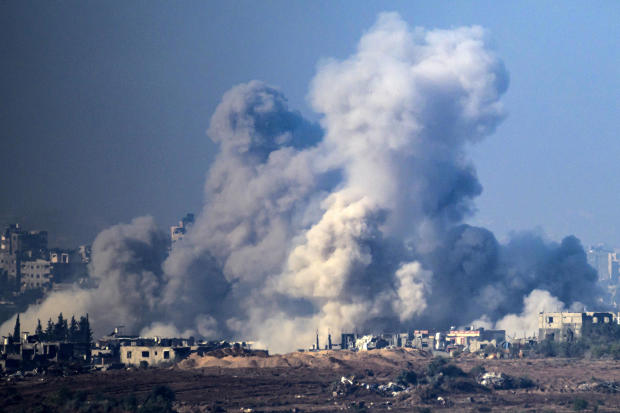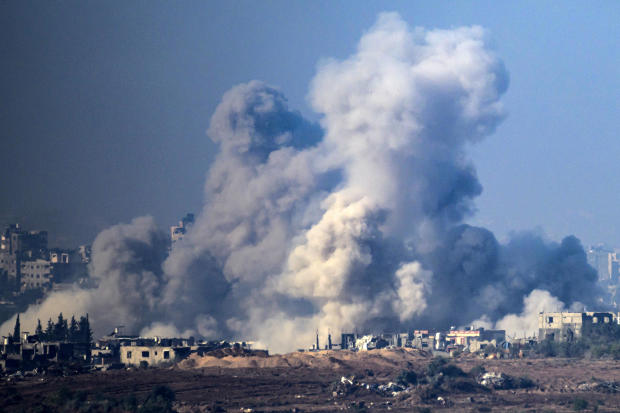The temporary cease-fire in the war between Israel and Hamas ended Friday morning after a week, as both parties confirmed that hostilities had resumed after Israel accused the militant group of violating the terms of the truce. Israeli war planes hit targets in the Gaza Strip, killing 32 people, according to the Hamas-controlled Ministry of Health in the Palestinian territory, as rocket warning sirens blared in southern Israel.
About an hour before the cease-fire was set to expire at 7 a.m. local time (midnight Eastern), the Israeli military said the country’s missile defense system had detected and intercepted a rocket fired toward Israeli territory from Gaza. Air raid sirens were heard in southern Israel Friday morning and schools in central Israel were told to open only if they have bomb shelters. Otherwise, classes were to be held remotely.
“Hamas violated the operational pause and in addition, fired toward Israeli territory,” the IDF said in a social media post. “The IDF has resumed combat against the Hamas terrorist organization in the Gaza Strip.”

JOHN MACDOUGALL/AFP/Getty
The government of Qatar, where negotiations have been taking place for weeks and where the terms of the cease-fire were agreed, expressed “deep regret” at the resumption of hostilities. It said “negotiations between the the two sides are continuing with the aim of returning to a pause.”
U.S. Secretary of State Antony Blinken, on his third visit to Israel since the war began, met Thursday with Israeli Prime Minister Benjamin Netanyahu and cautioned Israel to protect civilians in Gaza.
“Israel has one of the most sophisticated militaries in the world,” Blinken told reporters. “It is capable of neutralizing the threat posed by Hamas while minimizing harm to innocent men, women and children. And it has an obligation to do so.”
Hamas said negotiations had taken place throughout the night in an effort to agree a third extension of the pause in fighting, and that it had made offers including returning the bodies of a mother and her two young children who had been among the hostages seized by the group during its unprecedented Oct. 7 terror attack.
“The occupation refused to deal with all these offers, because it had made a predisposed decision to resume the criminal aggression,” Hamas claimed in a statement, attributing “full responsibility” for the resumption of the war to Israel and the Biden administration for its “absolute support for Israel.”
“Back to the nightmarish situation” in Gaza
After a strike in the southern Gaza city of Rafah on Friday, CBS News’ Marwan al-Ghoul found a boy at the scene in tears.
“We were there collecting water to wash our clothes. The bombing started and the rocks came flying at us,” the teen, Omar Hahrous, told CBS News. “I looked around me and I could not find anybody. Some were injured… some were martyred.”

CBS News
The head of the International Committee of the Red Cross, which has helped facilitate hostage and prisoner releases during the cease-fire, told French news agency AFP on Friday that the resumption of hostilities brought the roughly 2.3 million people of Gaza “back to the nightmarish situation they were in before the truce took place.”
“People are at a breaking point, hospitals are at a breaking point, the whole Gaza Strip is in a very precarious state,” Mardini told AFP in Dubai, where he was attending the U.N.’s COP28 climate summit.
U.N. High Commissioner for Human Rights Volker Turk, meanwhile, called the resumption of hostilities “catastrophic” and urged “all parties and States with influence over them to redouble efforts, immediately, to ensure a cease-fire — on humanitarian and human rights grounds.”

CBS News
The Reuters news agency cited officials in Egypt as saying the end of the truce meant truck convoys, which had delivered desperately needed food, fuel and other humanitarian essentials to Gaza through the Rafah border crossing every day during the pause in fighting, could no longer enter the territory.
Palestinian and international aid agency officials have said more aid was allowed into Gaza during the week-long cessation of violence, but nowhere near what is needed to address immediate requirements.
The Rafah crossing from Egypt is the only entry point to Gaza that has been opened for humanitarian supplies since the war began on Oct. 7.
Attack in Jerusalem, violence in West Bank
The fragile deal was strained this week by several incidents of violence, including a shooting early Thursday morning in which two gunmen opened fire on a crowded bus stop in Jerusalem, killing at least three Israelis and wounding six others. Blinken confirmed two of those wounded were also U.S. citizens. Hamas claimed responsibility for the attack.
“The terrorists just came out of the cars and start shooting right on the faces of normal people,” paramedic Israel Polak, who responded to the scene, told CBS News.
Hamas said the shooting was in response to the killing of children in the Palestinian refugee Camp in Jenin. Two boys, ages 8 and 15, were fatally shot at the camp Wednesday.
The last hostages released under the truce
The cease-fire began on Nov. 24 and was renewed twice. More than 100 Hamas-held hostages were released during that time, along with some 240 Palestinian prisoners. On Thursday, the seventh and last day of the pause in fighting, eight Israeli hostages were freed from Gaza and 30 Palestinians were released from Israeli prisons.
The Israeli hostages released Thursday ranged in age from 17 to 41 and included several dual-nationals.
Among them were siblings Aisha and Bilal Ziyadne, age 17 and 18, who were kidnapped from Kibbutz Holit, where they went to work with their father, Yousef, and their older brother, Hamza, according to a spokesperson for the Hostages and Missing Families Forum. Their father and older brother are still being held captive by Hamas, the spokesperson said.
Also freed was 21-year-old Mia Schem, a French-Israeli woman who had appeared in a propaganda video released by Hamas in October, where her right arm seemed to be injured. Her aunt told Israeli media Thursday it was operated on by a Palestinian veterinarian.
Her mother, Karen Schem, told CBS News at the time, “It’s very hard to see my daughter, I see the pain, I see that she’s in physical pain.”
More than 1,200 people, most of them civilians, were killed by Hamas militants during their Oct. 7 rampage across southern Israel, according to the Israeli military. The group has long been designated a terrorist organization by the U.S., Israel and many other nations.
The Hamas-run Gaza Health Ministry says almost 15,000 people have been killed in Gaza by Israel’s retaliatory ground incursion and airstrikes.
— Tucker Reals, Emily Mae Czachor, Chris Livesay and Holly Williams contributed to this report.
Faris Tanyos
Faris Tanyos is a news editor for CBSNews.com, where he writes and edits stories and tracks breaking news. He previously worked as a digital news producer at several local news stations up and down the West Coast.
